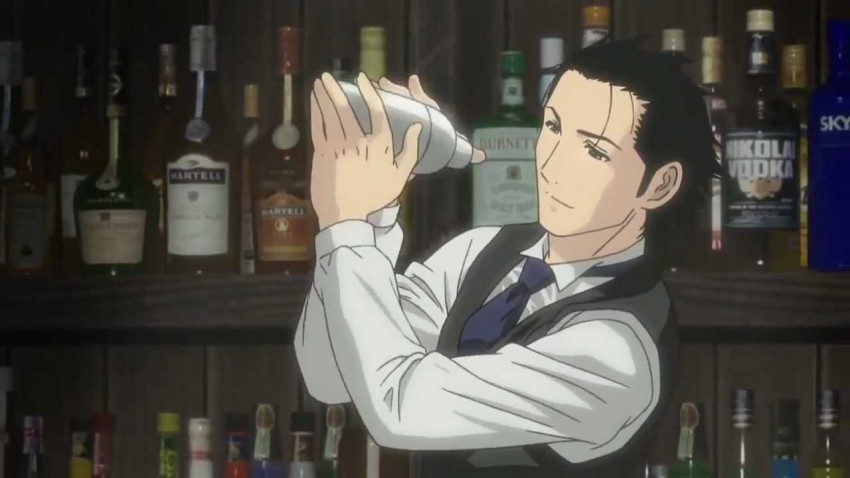Bartender
June 18, 2020 · 1 comment
By Shelley Pallis.
 The Ginza, which takes its name from the old silver mint that used to be there in samurai days, is one of the poshest parts of Tokyo – it’s the most expensive square on a Japanese Monopoly board, making it the equivalent of London’s Mayfair. And in Araki Joh’s 2004 manga Bartender (turned into an anime in 2006), it’s the location of Eden Hall, a pokey, super-high-end cocktail bar.
The Ginza, which takes its name from the old silver mint that used to be there in samurai days, is one of the poshest parts of Tokyo – it’s the most expensive square on a Japanese Monopoly board, making it the equivalent of London’s Mayfair. And in Araki Joh’s 2004 manga Bartender (turned into an anime in 2006), it’s the location of Eden Hall, a pokey, super-high-end cocktail bar.
Eden Hall is home to Ryu Sasakura, a French-trained barman with an encyclopaedic knowledge of the drinks of the world. You take a seat, you tell him your troubles, and he’s sure to come up with the perfect drink to lift your mood. In the anime adaptation from director Masaki Watanabe, we see offering advice and comfort to hoteliers, lawyers, a screenwriter, and… er… a specialist in computational fluid dynamics. No, it’s not quite Cheers, but it does sit at the end of a long tradition of stories in Japanese post-war pop culture that make food and drink the centre of the world.
The gourmet manga were a feature of Japan’s affluent Bubble era, tied in to the rise of yuppie readers with a broader interest than the usual genres. Manga started to appear about chefs and cooks, often themed around weekly recipes. Restaurant reviews started appearing in manga form, of everything from high-end restaurants to greasy-chopstick diners in the Tokyo slums. In one of the big success stories that managed to be both progressive and sexist at the same time, Tochi Ueyama’s Cooking Papa featured a gruff, square-jawed salaryman whose big secret was that his journalist wife was a hopeless cook, and that he made all the family meals.
Manga, of course, are knee-deep in workplace dramas, in which a fixed cast of regulars (in an airport, or at a bus station, or in a hospital…) deal with guest-stars that bring new plots to them. Kazuki Funatsu’s long-running Addicted to Curry, for example, focuses on the behind-the-scenes at a curry café, whereas Makazu Yamaguchi’s Adultery Canteen chronicles the sexual conquests of a travelling salesman who likes to sample far more than the local dishes. And then there’s Chiran, by Santa Uonome, which is all about the women who run a canteen for WW2 kamikaze pilots. Because of the ease with which such stories can be adapted for live-action prime-time drama (maybe not the kamikaze one, or the one about banging waitresses), they form a huge part of “real” Japanese television schedules, which is how we got a TV show about retired boxers running a cake shop (Antique Bakery).
It’s not hard to trace a path through Japanese pop culture to Bartender. Mai Kenmei and Tadashi Kato’s 1985 manga The Chef married the workplace drama to the maverick trouble-shooter of many a detective show – a genius cook who is able to salvage a swish corporate entertainment from whatever disaster of staffing and supplies is left in the kitchen. Such stories appeared in their manga form in the wealthy 1980s, and were resurrected as TV entertainment in the cash-strapped 1990s. Only a handful clung on in the 21st century, and those that did tended to either be about simpler foods – recipes you could try at home, or super-high-end food that was more like armchair tourism than a serious meal you could ever afford yourself.
After he created Bartender, Araki Joh worked with the artist Shinobu Kaitani on the 2006 manga Sommelier, in which a maverick wine-waiter, a bit of a loose cannon, a man who doesn’t play by the book etc. etc., is hired by a troubled Tokyo bistro to add a bit of class. One manga-turned-TV-show, Drops of God, by Tadashi Agi and Shu Okimoto, clung desperately to the connoisseur-conscious boom times, but in a recession-hit Japan where people couldn’t really afford the wine any more. Its protagonist, Kanzaki Shizuku, will not receive his inheritance from his deceased wine-critic father unless he successfully identifies and correctly describes thirteen incredibly posh wines, the twelve “apostles” and the titular grand prize, the “drops of god.”
When you look at some of the other gourmet stories out there, Bartender stops looking quite so ridiculous. Far from being some sort of prolonged boozer’s apology, it is more like a medical drama, casting the titular barman in the role of a counsellor and physician – always there with an ear for people’s problems, and a bit of handy advice. The cocktails he dispenses are hence regarded more as works of art or exercises in medicinal tonics. In a sly nod to Osamu Tezuka’s genius doctor Black Jack, who supposedly had the “hand of the gods”, barman Sasakura has the “glass of the gods” – an ability to knock up the world’s best cocktails. He can also tell what you’re thinking just by looking at your hands on the bar.
“It is a bartender’s job to observe the customers’ hands,” he says. “Happy hands, discontented hands, angry hands, rejoicing hands, lying hands, pleading hands, and hands that wipe away tears… The hands reflect the state of mind.”
Bartender will be released in the UK by Anime Limited.
Sarah Ash
September 7, 2020 7:26 pm
Even though I really love the idea of a cake shop run by retired boxers, Antique Bakery (based on the manga by Fumi Yoshinaga) has only one aspiring boxer on the staff: Eiji, who becomes an apprentice patissier and who's had to give up on his dreams of becoming a boxer because of detached retinas.